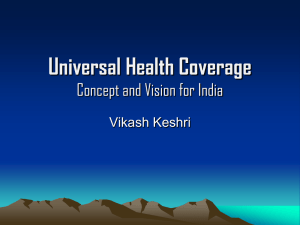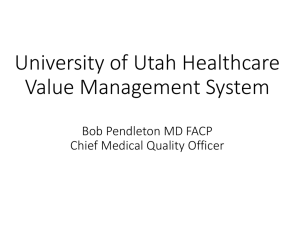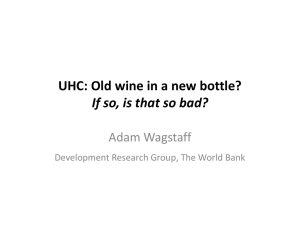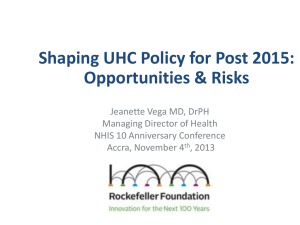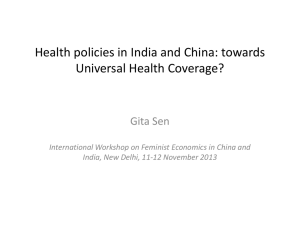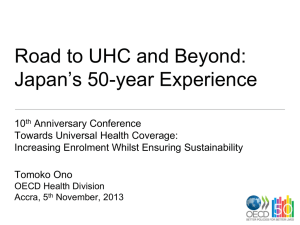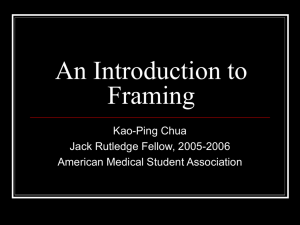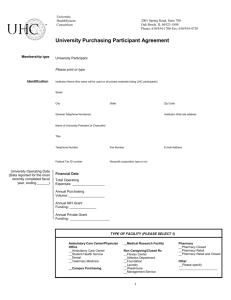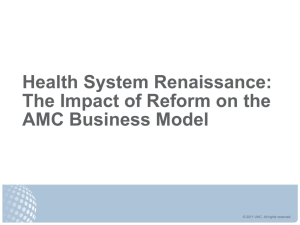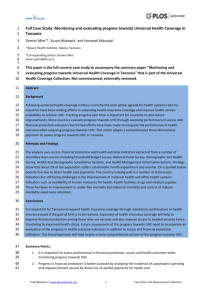2014_02_18_WHO_Global_UHC_presentation
advertisement
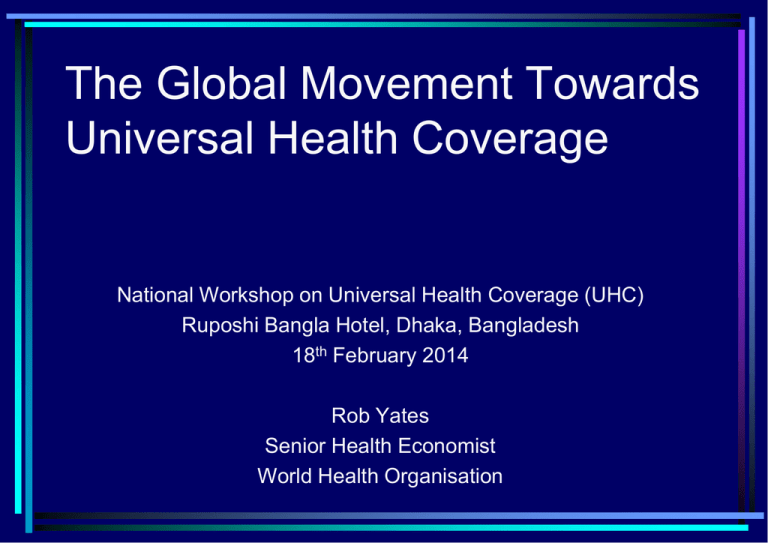
The Global Movement Towards Universal Health Coverage National Workshop on Universal Health Coverage (UHC) Ruposhi Bangla Hotel, Dhaka, Bangladesh 18th February 2014 Rob Yates Senior Health Economist World Health Organisation What is Universal Health Coverage? A simple definition on UHC: All people receive the quality health services they need without suffering financial hardship UHC is already a global priority • “We must be the generation that delivers Universal Health Coverage” Dr Jim Kim, President of the World Bank, 21/05/2013 • “Universal coverage is the single most powerful concept that public health has to offer” Dr Margaret Chan, DG of WHO, 23/05/2012 The Three Dimensions of UHC Economics Politics Health UHC is fundamentally about EQUITY • Universal = Everybody. Nobody left behind • Health services allocated according to NEED • Health financing contributions according to one’s ability to pay • Healthy-wealthy cross-subsidise the sick and the poor • Not just curative services: preventive, rehabilitative, palliative too • Services must be good quality to be effective UHC is achieved through PUBLIC Financing • Market-driven privately financed health systems do not result in UHC • The state must force the healthy-wealthy to cross subsidise the sick and the poor • The state must be heavily involved in all three main financing functions of raising revenues, pooling and purchasing services • Hence public financing is the key to UHC • This doesn’t rule out private sector administration or provision of services Emerging consensus on health financing for UHC • User fees are “unjust and unnecessary” Jim Kim, President World Bank , May 2013 • Private voluntary insurance including community based insurance is ineffective, inefficient and inequitable • Public financing (tax financing and social insurance) is the key to UHC • All countries need to use tax financing to cover those not in formal employment A key difference between WDR 1993 and the new Lancet Commission is the latter's emphasis on universal health coverage (UHC) and its stance towards private voluntary insurance—the market forces of WDR 1993 now rejected in the 2013 Commission. “We are much more explicit about UHC in the 2013 report”, Jamison says. “The path to UHC cannot work with reliance on voluntary private insurance”. http://www.thelancet.com/journals/lancet/article/PIIS0140-6736(13)62613-6/fulltext?rss%3Dyes Rapid Scale Up Towards UHC Using Public (Mostly Tax) Funding to Cover the Untargeted Informal Sector Households from poorest to richest 120 100 Social health insurance contributions collected from those in formal employment 80 More efficient and equitable if these risk pools can be merged 60 40 20 0 Shift to universal entitlement to publicly funded services using predominantly tax financing Bottom line: where government spends more on health, people spend less out-of-pocket 90 80 India OOPS as % total health spending 70 Armenia Georgia 60 Egypt KyrgyzstanAlbania Iran Bosnia & Herzegovina 50 Philippines Moldova Kazakhstan 40 Romania 30 Thailand Hungary Serbia & Montenegro 20 Bhutan USA 10 R2 = 0.66 0 0 1 2 3 4 5 6 Public spending on health % GDP 7 8 9 Source: WHO estimates for 2004, excluding countries with population < 600,000 10 Lessons from UHC successes • Have prioritised population coverage • Recognised failings of private voluntary mechanisms including community insurance • Heavy reliance on compulsory public (especially tax) financing with some SHI • Cover the informal sector as one group tend not to target the poor • If they take premium contributions from the informal sector these are very small • No user fees or only very small co-payments The Global Campaign for UHC • Global UHC Campaign being driven by political leaders, governments and civil society, not technical agencies • Especially MICs that have recently made big progress towards UHC • WHA Resolutions in 2005, 2008 and 2011 on UHC. World Health Report 2010 • UN General Assembly Resolution Dec 2012 – co-sponsored by the US! Concluding thoughts • UHC is good for population health • UHC is easy to understand • UHC is popular with people and politicians across the world – it brings politics into health systems • Governments are the driving force behind UHC and for it to become a post-2015 Goal • Development agencies should embrace UHC and be prepared to engage in the politics of extending coverage
